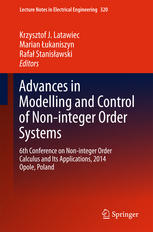

Most ebook files are in PDF format, so you can easily read them using various software such as Foxit Reader or directly on the Google Chrome browser.
Some ebook files are released by publishers in other formats such as .awz, .mobi, .epub, .fb2, etc. You may need to install specific software to read these formats on mobile/PC, such as Calibre.
Please read the tutorial at this link: https://ebookbell.com/faq
We offer FREE conversion to the popular formats you request; however, this may take some time. Therefore, right after payment, please email us, and we will try to provide the service as quickly as possible.
For some exceptional file formats or broken links (if any), please refrain from opening any disputes. Instead, email us first, and we will try to assist within a maximum of 6 hours.
EbookBell Team

4.8
84 reviewsThis volume presents selected aspects of non-integer, or fractional order systems, whose analysis, synthesis and applications have increasingly become a real challenge for various research communities, ranging from science to engineering. The spectrum of applications of the fractional order calculus has incredibly expanded, in fact it would be hard to find a science/engineering-related subject area where the fractional calculus had not been incorporated. The content of the fractional calculus is ranged from pure mathematics to engineering implementations and so is the content of this volume. The volume is subdivided into six parts, reflecting particular aspects of the fractional order calculus. The first part contains a single invited paper on a new formulation of fractional-order descriptor observers for fractional-order descriptor continous LTI systems. The second part provides new elements to the mathematical theory of fractional-order systems. In the third part of this volume, a bunch of new results in approximation, modeling and simulations of fractional-order systems is given. The fourth part presents new solutions to some problems in controllability and control of non-integer order systems, in particular fractional PID-like control. The fifth part analyzes the stability of non-integer order systems and some new results are offered in this important respect, in particular for discrete-time systems. The final, sixth part of this volume presents a spectrum of applications of the noninteger order calculus, ranging from bi-fractional filtering, in particular of electromyographic signals, through the thermal diffusion and advection diffusion processes to the SIEMENS platform implementation. This volume's papers were all subjected to stimulating comments and discussions from the active audience of the RRNR'2014, the 6th Conference on Non-integer Order Calculus and Its Applications that was organized by the Department of Electrical, Control and Computer Engineering, Opole University of Technology, Opole, Poland.